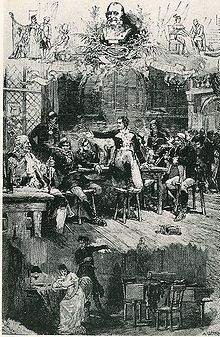The Tales of Hoffmann
| The Tales of Hoffmann | |
|---|---|
| Opera by Jacques Offenbach | |

Scenes from the Paris premiere
|
|
| Description | Opéra fantastique |
| Native title | Les contes d'Hoffmann |
| Librettist | Jules Barbier |
| Language | French |
| Based on | three short stories by E. T. A. Hoffmann |
| Premiere | 10 February 1881 Opéra-Comique, Paris |
The Tales of Hoffmann (French: Les contes d'Hoffmann) is an opéra fantastique by Jacques Offenbach. The French libretto was written by Jules Barbier, based on three short stories by E. T. A. Hoffmann, who is the protagonist of the story. It was Offenbach's final work, as he died a year before the premiere.
Barbier and Michel Carré had previously written a play, Les contes fantastiques d'Hoffmann, which was produced at the Odéon Theatre in Paris in 1851, and which Offenbach had seen. After returning from America in 1876 he learned that Barbier had adapted the play and it was being set to music by Hector Salomon at the Opéra. Salomon handed the project to Offenbach. Work proceeded slowly interrupted by the composition of more profitable lighter works. Offenbach himself had a premonition that like Antonia he would die prior to its completion.
He continued working on the opera throughout 1880, attending some rehearsals, but died on 5 October with the manuscript in his hand four months before the opening. Shortly before he died he had written to Léon Carvalho: "Hâtez-vous de monter mon opéra. Il ne me reste plus longtemps à vivre et mon seul désir est d'assister à la première" (Hurry up and stage my opera. I have not much time left and my only wish is to attend the opening night).
The stories used in the opera were:
The opera was first performed in a public venue, at the Opéra-Comique on 10 February 1881, without the third (Venice) act. It had been presented in an abridged form at Offenbach's house, 8 Boulevard des Capucines, on 18 May 1879, with Madame Franck-Duvernoy in the soprano roles, Auguez as Hoffmann (baritone) and Émile-Alexandre Taskin in the four villain roles, with Edmond Duvernoy at the piano and a chorus directed by Albert Vizentini. Besides Léon Carvalho, director of the Opéra-Comique, the director of the Ringtheater in Vienna, Franz von Jauner, was also present. Both men requested the rights, but Offenbach granted them to Carvalho.
...
Wikipedia
